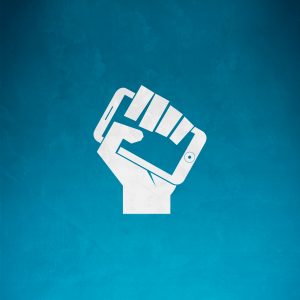Digital Activism
by Victoria McAuley and Dominique Rivera

Keep Data Safe in the Digital Revolution – by ulltium Consulting, Inc. (2016), from ulltium Consulting, used under CC 1.0
“Political engagement is as old as politics itself (Braddick, 2014), but social media has changed the game for many activists around the globe. From #metoo to Kony2012, social media activism is creating a platform to disseminate ideas quickly and to compel people to join causes; but, at the end of the day, is it helping or hurting our digital identities?
Social media activism can take many forms on many different platforms. Your friend’s Kickstarter for the local animal shelter, the petition you signed about election reform, and the hashtag you follow about Indigenous rights in the Canadian context are all forms of social media activism. RESET.org defines the practice as: “where digital tools (the internet, mobile phones, social media, etc.) are used towards bringing about social and/or political change” (Rees, 2015), and it has been growing in popularity since the 1990s (Peters, 2011). Over the past 5 years, popular activism campaigns have included: Kony2012, #blacklivesmatter, Occupy Wall Street, Je Suis Paris, #metoo, and the Women’s March campaign. All of these movements have gained traction in online spaces, and political action in the physical world. Some campaigns have brought about enormous social change, while others continue to struggle against multiple axes of oppression.
Unfortunately, not all online activism is created equal, and as the number of digital movements has skyrocketed, so too has the risk of malicious activism: fraudulent counter movements, like the Women’s March scam in Bangladesh, and the Black Lives Matter page scam are eroding the positive foundations created by successful campaigns; tracking devices threaten the safety of activists around the globe; and, critics of “slacktivism” are calling into question the efficacy of hashtags and trending topics.”
What is Digital Activism?
Digital Activism is also known as, Social Media Activism, Online Activism, Internet Activism, Web 2.0 Activism, and Hashtag Activism (a new form of Activism in the new age medium). But what is this Digital Activism? It is when a policy or action of a campaign moves from the foreground onto the internet/social media for viral attention and traction [1]. Digital Activism has the ability to bring activism to new levels of outreach, by engaging audiences all over the world through campaign hashtags [2].
With the 1990 campaign of the Lotus Marketplace which was organized through message boards and emails, Digital Activism was born. Since then many movements have been brought to life through social media using hashtags, for example, such as #MeToo, #BlackLivesMatter, #Kony2012, #PrayforJapan, and ASLIceBucketChallenge.
Hashtag Activism
Hashtag Activism is considered as activism that is used on platforms such as Twitter using hashtags to bring awareness to the respective movements [3]. This term has evolved to also refer to a user liking or sharing campaigns hashtagged posts [4].
Hashtag Activism provides a platform for everyday people to voice their stories through the use of the hashtag campaign. But with this greater outreach and ability to gather strength through numbers, there is more concern and threat about the abuse of this power [5].
One concern with Hashtag Activism is that users are no longer participating for the greater good of the cause but instead are using the cause for revenge (TedTalk). For example, in Tarana Burke’s TedTalk (2018), Tarana discusses how the Me-Too movement has changed from a social movement to a trolling expedition. Me Too was originally created as a safe space for the voice of women sexually harassed, to tell their stories, shed light in hopes of stopping future sexual harassment [6]. The Me Too Movement is meant to defer sexual violence and provide resources to the victims, but it has become the hashtag #MeToo of trolling [7]. There have been incidents where victims have been threatened to remove their #MeToo stories, making this online community an unsafe place for victims to share their personal stories [8].
Another downside to Hashtag Activism is the false accusations of some social media users that can escalate in proportion potentially ruining people’s lives [9].
Social Media has brought awareness to movements that deal with tough situations such as sexual harassment. And although a lot of people are participating through these hashtags, it has also made some users wary in sharing their stories and of certain situations.
“We know that it has led to injustices, such as the wrongful expulsion and tarnishing of an innocent accused. I have actually had female students write to me saying they’ve heard rumors that some scientists are afraid of accepting female graduate students because if any of them makes an accusation of sexual harassment in an atmosphere where you believe the victim, it’s impossible for them to defend themselves. They don’t really want to take the chance. So that’s a negative consequence of having a policy that is not driven by principles of evidence.” [10]
Although every success has its downsides, Social Media has opened doors for people throughout the world to now tell their stories as never before. Some of these stories are saving lives by participating in these movements and/or helping others through online resources funding those in need [11].
Unfortunately, there have been many movements/activists since the inception of social media which have been derailed from their original intentions due to trolling expeditions. This leads to important questions such as: How does an online user successfully contribute to their cause using Digital Activism? And in doing so, how can an individual protect their Digital Identity?
Additional Readings:
Me Too Movement articles | The New York Times
Pelosi says Trump is trying to “break the Me Too movement” | The Washington Post
Person of the Year 2017: The Silence Breakers | TIME Magazine
The Overwhelmed Person’s Guide to Activism | Medium
Edited by: Elyse Hill

